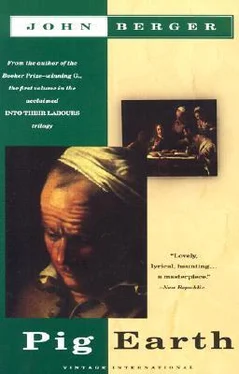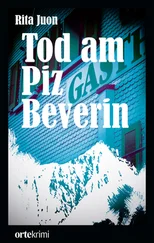“Is the gun loaded?” she whispered.
He handed it to her and she took out the cartridges.
When she was working at the doctor’s house, she had received the letter from Mathieu saying that his wife was ill and that she must return immediately. By leaving so abruptly she lost two months’ wages. She protested to the doctor’s wife that nobody could foresee illness. For illness there are hospitals, was the reply. Catherine picked up one of the pokers she had polished every morning. The doctor’s wife screamed for help. The cook came running to the rescue. She found the mistress of the house clutching the curtains as if she had been surprised naked. And the mad Savoyard maid was standing with a poker in her hand looking at the fire.
“Tomorrow,” Jean-François said, “we’ll come and cup you. Eh, Nicolas?”
“I might be better off on the other side,” she said.
“Seigneur!” screamed her brother. “Stop talking like that. We’re coming tomorrow.”
When they came, the two men stuffed the stove with wood. She stripped naked to the waist and sat on a chair. “It’s not the first time you’ve seen a woman,” she said to Jean-François.
“What difference does that make?” demanded Nicolas. “We’re going to cure you.”
On the table was a set of glasses with a candle. Jean-François lit the candle, wiped a glass, tore a shred of newspaper, put it in the candle flame and when it was burning, placed it in the glass. Nicolas pressed the rim of the glass hard against his sister’s back. Almost immediately the flame went out. The skin beneath her shoulder-blade was white and soft, not very different from when she was a young woman. Tentatively, Nicolas’ large hand abandoned the glass to see whether the vacuum would hold it against the flesh. Glass and flesh stayed firm.
Jean-François prepared the fire in a second glass.
“Put it,” he said, “where there’s plenty of meat.”
“Never on the vertebral column,” proclaimed Nicolas.
“I said where there’s meat!”
They applied five glasses. Her skin rose up inside them like pies in an oven. She held the table with her arms to steady herself against the hurt.
“I don’t want you to hear me cry out.”
“I’ll sing,” offered Nicolas.
He sang:
La vie est une rose
La rose piquera …
When it came to removing the glasses, Jean-François did it because Nicolas’ nails were too broken. He ran his finger-nail round the rim of the glass, making a tiny trench in the flesh, to let the air in.
“Ah,” she sighed, as each glass came off. “Thank you, my friend!” Two days later she was cured.
Now together in the same kitchen the three of them were dispirited by the day’s work which had yielded nothing.
“They have a machine,” mused Jean-François, “for detecting water underground, like a water diviner’s stick, only it’s electronic. And it finds where water is to twenty centimetres.”
“Where?” asked Catherine, on the edge of her chair.
“It costs seventy thousand francs to hire.”
“Merde de merde!” said Catherine.
Next morning the three of them surveyed the three trenches. During the night, as if encouraged by their digging, moles had thrown up their own earthworks over most of the field. This made all the digging look less systematic.
“In this earth,” roared Nicolas — and between each phrase he struck with his pick—“in this damned earth of this damned field in this damned fog I have a rendez-vous with the Devil!”
By the afternoon they had still not found any sign of any pipe. Occasionally in the kitchen Catherine heard one of their raised voices. She could not distinguish the words but the tone of the shouting was enough to tell her how discouraged they must be. “If they don’t find it today, they won’t come back tomorrow.”
She put more wood on the stove, took her slippers out of the oven and shut the oven door. “I have wasted two of their days,” she muttered. She set about preparing some pastry. When it was rolled out, she made small pastry purses, each large enough to hold a five-franc piece. Into the purses she put purée of apples. She made twenty-five.
She packed the pastries with the coffee-pot, gnôle and cups into her canvas bag, and strode across the orchard. Before the men became visible through the fog she stopped and adjusted the scarf tied round her head. She held out the bowl of sugar so that each man could sugar his coffee to his taste. She herself poured the eau-de-vie plentifully into their cups. The men held them with both hands and gazed around them into the fog.
“Mathieu!” muttered Nicolas. “Mathieu was cunning. He could have laid this pipe at a depth of eighty centimetres and it would still have been safe from the hardest frost. But no! Not Mathieu. He had to lay it at a metre!”
“The moles have eaten the pipe.”
“The pipe has gone to La Roche, I tell you!”
Corner by corner, she unfolded the napkin wrapped round the pastries. Baked a light brown, they steamed in the air. The smell made the two men glance at each other and smile with complicity.
“We used to eat them after midnight mass at Christmas,” said Nicolas quietly.
“The blood’s coming back,” said Jean-François.
Between mouthfuls of coffee, they ate them one by one.
When they were finished, Catherine issued her command: “No more work today.”
The two men put on their coats and, by an accord of common tact, nobody mentioned tomorrow.
She woke up when it was still dark. She did not expect the men to return for a third day’s work. After she had fed the goats and cleaned the stable, the sky was as blue and large as it only is over the mountains. In the valley, through the transparent early-morning mist were church, dairy, cemetery, two cafés, post office: the village. The worst about real fog is that it hangs square like a curtain. Vertical and horizontal. The best about it lifting is that all the slopes are revealed and everything is precipitous.
She went to fetch her water, downhill, across two fields. She had done this ever since the water had dried up. All her father’s life and grandfather’s life the sound of water had marked the place below where it was easy to fill buckets.
What she feared was the ice. The ice would soon be back. The pine trees, only one hundred metres higher up towards La Roche, were white with hoar-frost, not a needle, not a spider’s web had escaped its white load. She feared that when the slope was frozen with ice, she might slip as she carried the buckets, and break a leg, and lie there all day without being found.
“On the other side I’d have no goats to look after, no potatoes to lift, no chickens to feed. I would have all the time in the world, and I could make all the visits I don’t make now. Yet I don’t want to die out of the house. I want to see death come past the things I’ve lived with. Then I can concentrate and not be distracted.”
In the clear air which no longer muffled sounds, she heard Jean-François’ voice, high up, in the field by the orchard.
“I tell you where it is! Here! Here is where I am betting it is! You’ll see. I thought about it in the night. This is where it is. Within half a metre of here!”
Leaving the two buckets, she clambered up, shouting, “I don’t believe it!”
They did not begin digging where Jean-François had driven in his spade to mark his bet. They systematically extended the long trench which would eventually come to the point he had indicated.
After two hours, Nicolas said: “The earth has been worked here. Fifty years ago maybe, but the earth has been worked here.”
The only sign of his impatience was that he wielded the pick with shorter pauses.
Читать дальше












